The Ideational Meaning in Khalil Gibran’s work “The Prophetâ€
##plugins.themes.academic_pro.article.main##
Abstract
Literary language is the link between fellow members of society in social and cultural activities, but the style of language in literature is different from the language in daily conversation. This study focused on reporting the analysis of ideational meaning realized in Khalil Gibran’s work “The Prophetâ€. Therefore, this study aimed to explain the realization of processes of transitivity realized in Khalil Gibran’s work “The Prophet†and the realization of circumstance of transitivity realized in Khalil Gibran’s work “The Prophetâ€. This study was chosen because the language in the poetry is different from language in the daily conversation. Interpreting meaning of poetry use transitivity to explain how a meaning is represented in a sentence. This study was a qualitative which the data taken from the internet and chosen the collection of poetry in Khalil Gibran’s work. The data were gathered through observation sheet and analysed using the theory of transitivity. The result of this study showed that all processes of transitivity were realised in Khalil Gibran’s work, material processes was the highest frequency with total 609, and material processes were dominated among processes. The study also showed that only five circumstances of transitivity were realized in Khalil Gibran’s work. The circumstance of location was the highest frequency with total 170. By learning the ideational meaning, teacher and student will be able to interpret every meaning in poetry. For the next future research, it can be reference to analyses kinds of literature by using transitivity.
